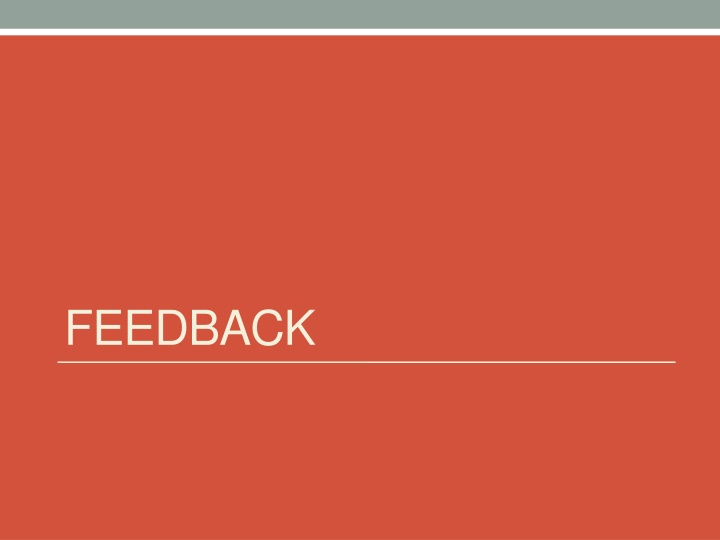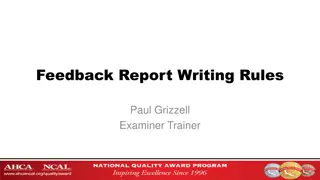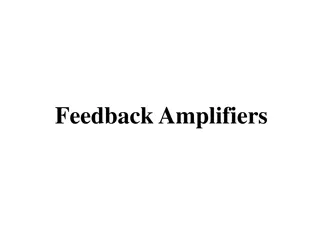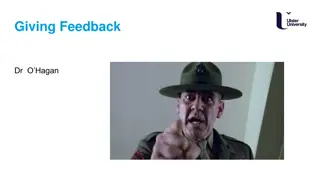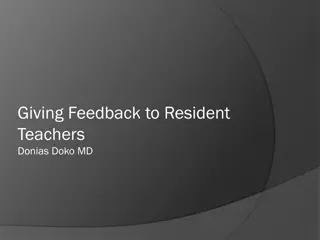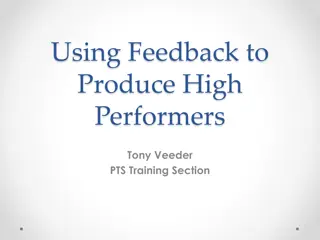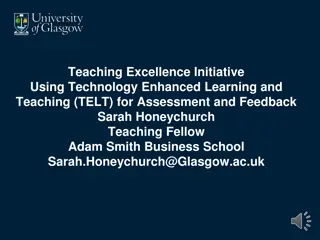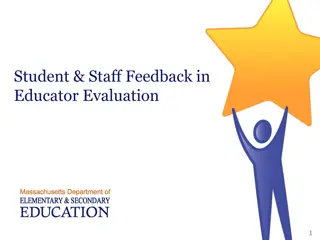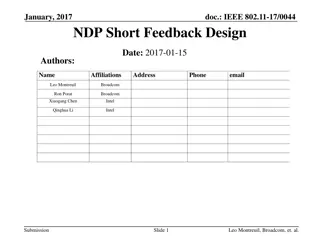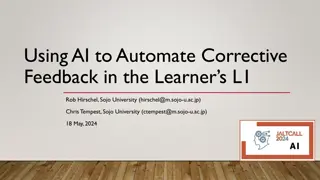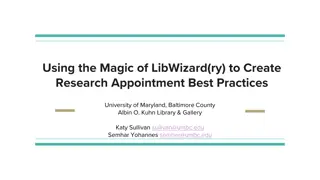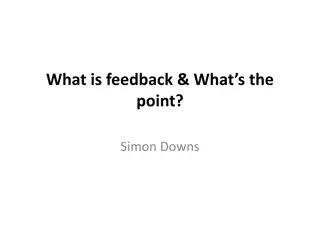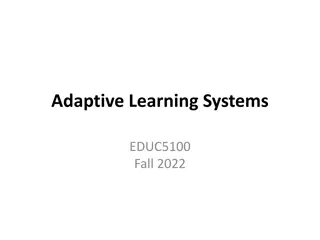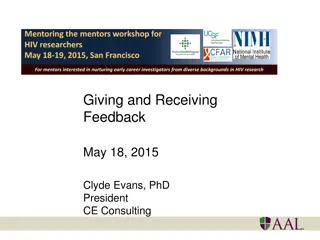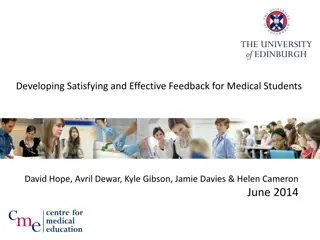Feedback and Learning Essentials
Learning success depends on self-regulation, which relies on accessing feedback to bridge knowledge gaps. However, feedback can be ineffective if not delivered or received appropriately. Principles for giving feedback include making it a normal practice, clarifying performance criteria, providing timely feedback, focusing on a few key points, engaging in two-way communication, and ensuring understanding. Understanding the Conscious Competence Model helps in recognizing skill levels. Feedback is crucial but complex, influenced by factors like credibility, receptivity to criticism, and alignment with learning goals.
Download Presentation

Please find below an Image/Link to download the presentation.
The content on the website is provided AS IS for your information and personal use only. It may not be sold, licensed, or shared on other websites without obtaining consent from the author.If you encounter any issues during the download, it is possible that the publisher has removed the file from their server.
You are allowed to download the files provided on this website for personal or commercial use, subject to the condition that they are used lawfully. All files are the property of their respective owners.
The content on the website is provided AS IS for your information and personal use only. It may not be sold, licensed, or shared on other websites without obtaining consent from the author.
E N D
Presentation Transcript
Learning depends on self-regulation Self regulation depends on learners being able to access information that tells them the gap between where they are and where they need to be Feedback is therefore the lifeblood of learning .
What is your experience of receiving feedback? What is your experience of giving feedback?
Literature shows feedback often useless and sometimes counter-productive
Feedback is only one source of cue about learning and performance Acceptance and uptake of feedback is complex and not assured Depends on; Learner perceptions of evaluator credibility as role model Learner receptivity to constructive criticism Alignment with learner s learning goals and self- assessment
Can we establish some general principles for giving feedback?
Principles of feedback in the clinical setting Make it normal a everyday thing Ensure that learners are clear about the criteria against which their performance will be judged. Feedback at the time of an event or shortly afterwards. Feedback should be limited to one or two items only Make sure it is a two-way conversation Check the learner understands the feedback
The Conscious Competence Model Conscious Incompetence Unconscious Competence The learner is unaware of their lack of a particular skill The learner is able to do the skill but has to think about each step The learner grasps the importance of a skill but fails when trying to attempt it The learner is now able to do the skill without much thought Unconscious Incompetence Conscious Competence
Joharis Window Perceived Needs -in the two left boxes. Known to self Unknown to self Unperceived Needs -in the two right boxes. Known to others OPEN ARENA - by definition doesn t need exploring BLIND SPOTS - explored by feedback The Fa ade is explored by disclosure from the trainee. Aided by - the trainer creating the right environment - The trainer role modelling the process The Blind Spots box - trainer traditionally opens by giving constructive feedback - now mainly comes from the WPBA tools. Unknown to others FA ADE - explored by disclosure HIDDEN - revealed by joint exploration The Hidden box - opened up by joint exploration between trainer and trainee - helped by the trainer s ability to ask telling questions and - a curiosity and interest in the trainee s development.
Millers Pyramid Linking knowledge to skills Does Shows how Knows How EXPERT Knowledge Skills Attitudes NOVICE Knows
Pendletons Rules . Problems?
ALOBA Agenda led Outcomes Based Analysis; Agenda - ask the learner to highlight problem areas Define Outcomes- what do we want to achieve Elicit the learner s thoughts and feelings and get him/her to make suggestions about how things could be better Involve the group in problem solving Facilitator then makes suggestions and generalises the learning Check everyone happy that the agenda is covered and feedback appropriate
SET-GO What do you See What Else do you see What do you Think (encourage the learner to reflect and problem-solve) then to group: What Goal would we like to achieve Any Offers of how to get there (rehearse suggestions as appropriate
Unconscious incompetence Conscious incompetence Conscious competence Unconscious competence learner Low level of competence. Unaware of failings Low level of competence. Aware of failings but not having full skills to correct them Demonstrates competence but has to think about activities Carries out tasks with conscious thought. Skills internalised and routine. Little or no conscious awareness of detailed processes involved in activities teacher Helps learner to recognise weaknesses, Helps learner to develop and refine skills, reinforces good practice and competence, demonstrates skills Helps learner develop/refine skills, reinforces good practice through positive regular feedback Raises awareness of detail and unpacks processes for more advanced learning, notes any areas of weakness/bad habit
